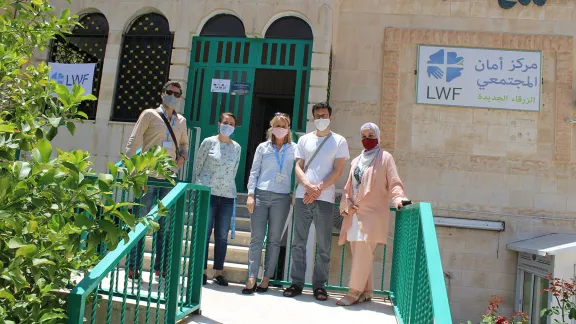
Erik Siegl from Czech Diaconia with LWFâs Caroline Tveoy and staff from the World Service team in Jordan outside the Aman community center in Zarqa. All photos: LWF/Jordan
Czech Diaconia continues to support LWF’s vital education and skills training for Syrian refugees in neighboring Jordan
(LWI) - A decade on from the start of the Syrian conflict, the Lutheran World Federation (LWF) remains committed to providing vital education, skills training and psycho-social support to thousands of refugees living in neighboring Jordan. In the wake of the COVID-19 pandemic, the demand for such services has risen sharply, both in Za’atari refugee camp and in Zarqa, Jordan’s second most populous city.
Erik Siegl is head of international projects for Czech Diaconia, the aid and development arm of the Evangelical Church of the Czech Brethren (ECCB), which has been supporting LWF’s work in Jordan since the start of its operations there in 2012. He has just returned from a visit to the region and was impressed to see how the programs have adapted to the many challenges posed by the pandemic.
Ten years after the outbreak of fighting in Syria, over six and a half million people remain internally displaced, while more than 6.6 million others have fled the country, the vast majority seeking refuge in neighboring countries. 80.000 refugees are housed in Za’atari camp on Jordan’s northern border with Syria, with little hope of returning home until a political solution to the conflict can be found.

Inside the Aman community center in Zarqa, LWF Jordan staff explain how activities have been expanded to include both online and in person classes.
In 2019, Czech Diaconia, with funding from the Czech government, stepped up its efforts to support the establishment and operation of the Smurf Center, a kindergarten for pre-school children of refugee families. “It is a great project and we are proud to be a part of it,” Siegl says, although he adds that the center has remained closed for most of the past year due to COVID-19 restrictions.
Other LWF activities, supported by the ECCB with government funding, include a livelihoods project which offers skills training and distribution of micro grants for home-based small businesses. When the pandemic began, 10.000 Euros were allocated to support a sewing workshop for the production and distribution of face masks, the only Non-Governmental Organization (NGO) producing on site free masks for camp residents.
“Thanks to LWF, with funding from the Czech Ministry of the Interior and other doners, masks and hygiene kits were distributed to almost all households in the camp,” Siegl says. He notes how successfully the organizers of the original workshop were able to adapt to the new challenges of continuing to provide essential livelihoods, while also offering important advice and protection from the pandemic.

Art work produced by students attending classes at the Aman community center in Zarqa.
In Zarqa, where restrictions in urban areas have now been largely lifted, Siegl visited the ‘Aman’ (Safe) community center which was bustling with activities and has expanded onto a second floor of the building. “It was so encouraging to see that more courses have been introduced, both online and now in person again, which has greatly increased the outreach of these much-needed activities,” he says.
Accompanied by ECCB Diaconia director, Ms Kristina Ambrozova and staff from LWF’s Jordan team, Siegl saw children and adults taking part in art and music workshops, English languages courses, sports and Zumba classes, as well as dietary and psycho-social counselling to help young people share their problems in a safe environment.
“Like everywhere else,” Siegl says, “the demand for these services is increasing in the wake of both the pandemic and the economic depression. Most families don’t have money to fund such activities for themselves or their children, but the center offers everything for free. It was so energizing to see the children focused on developing new skills, meeting friends and enjoying themselves.”
Strengthening local NGOs
Siegl adds that he was “very positively struck by the work of the volunteers, both Syrian and Jordanian,” who are running most of the courses in the center. “They are very competent, very skillful, very engaged,” he says, highlighting how the LWF has been working to support and strengthen the presence of local NGOs in Jordan.
LWF’s Regional Program Coordinator, Ms Caroline Tveoy, who was also visiting Jordan for the first time since the start of the pandemic, commended the “active, long-standing partnership with the ECCB Diakonia, with funding from the Czech government and the Czech Embassy in Amman.” She added: “Without such partnerships, we would not be able to maintain our support for Syrian refugees and vulnerable Jordanians, especially over these past 18 months since the pandemic started. We know the needs are greater than ever and it is so helpful to know that we are mutually committed to continuing the joint work in Jordan.”
“The community center is a unique place, where people can find joy and leave their everyday difficulties behind for a while,” Siegl reflects. “No one is seeing a light at the end of the tunnel for the Syrian crisis and the increasing demand for services has just underscored the importance of the LWF presence here,” he concludes.
LWF/P. Hitchen


